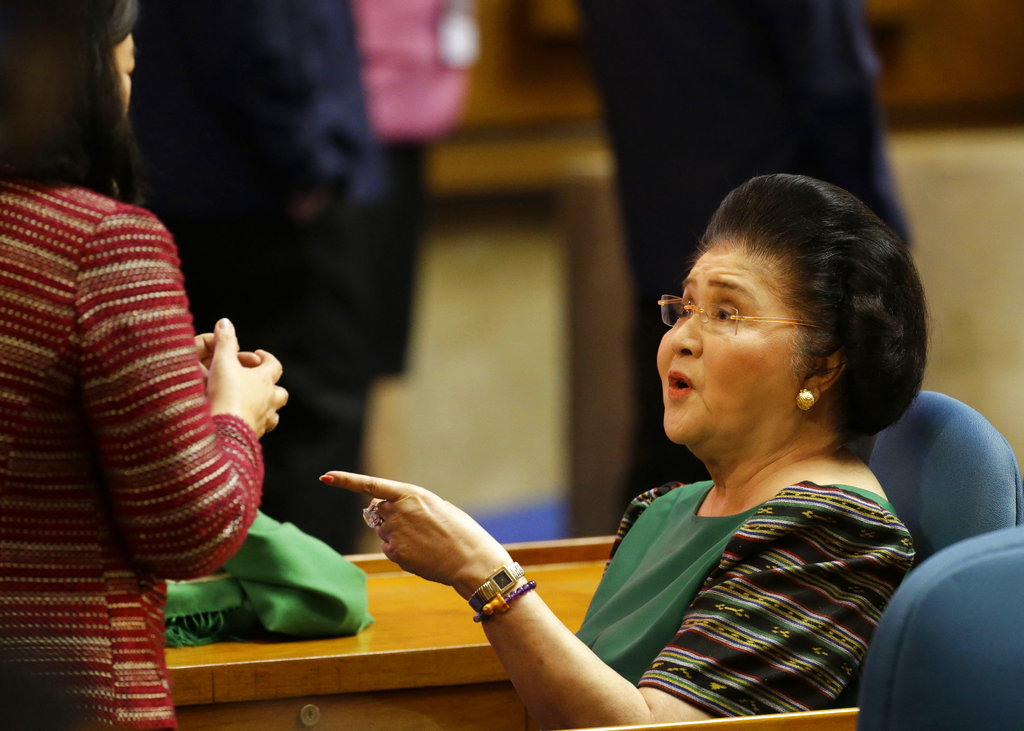The Supreme Court has affirmed a decision by the Court of Appeals to dismiss a case that sought to reverse the acquittal of Imelda Marcos, widow of dictator Ferdinand Marcos, of money laundering in connection with their secret Swiss bank accounts.
In a decision dated June 27 but made public only this week, the Supreme Court’s Third Division denied for lack of merit the petition for certiorari filed in 2008 by the late Solicitor General Frank Chavez.
“Petitioner having failed to establish the basis for this court to evaluate and review the facts in this case the petition may be dismissed on this ground,” read the 53-page decision written by Justice Marvic Leonen.
The other division members, Justices Presbitero Velasco Jr., Lucas Bersamin, Francis Jardeleza and Samuel Martires Jr., who is now the Ombudsman, all concurred in the ruling, which also castigated the prosecution for mishandling the case.
Chavez had sought the reversal of the Court of Appeals’ November 2008 decision to uphold the Manila Regional Trial Court’s acquittal of the former first lady, who is currently Ilocos Norte representative, on grounds of reasonable doubt in March that year.
The RTC trial was marred by numerous postponements, as well as a motion filed by the prosecution seeking the inhibition of the judge, Silvino Pampilo, in 2007.
‘Lackadaisical’
The Supreme Court scolded the government side for losing the case, saying, “The prosecution could have done better in this case. Sadly, it failed.”
“This petition arose from what appears to have been such an important case for the government, which involves accountability for millions of pesos spirited away by respondent, filed in the lower court. Yet, it appears that the government’s resolve to prosecute has been lackadaisical, to say the least,” the ruling said.
The court referred to what it called as “fatal errors that should have been avoided by veteran litigators, such as a habit of postponements and a lack of preparation.”
The justices noted that the prosecutors and their witnesses appeared to have requested several postponements on grounds which, to the court, “do not outweigh the grave public interest suggested by the various Information filed against respondent.”
“The lower court’s liberality in granting the various continuances does not seem to have been met by the presentation of evidence with a depth and quality that would have shown the diligence and seriousness of the prosecution,” the court said.
18 Swiss accounts
The case involved the 18 bank accounts in Geneva and Zurich, Switzerland, which were discovered to have been opened and maintained by the Marcos couple from 1973 to 1985.
The foreign deposits, according to the 33 consolidated criminal complaints filed in 1991, violated Central Bank and other government regulations and were claimed as proof of the ill-gotten and hidden wealth of the Marcoses by President Corazon Aquino’s government.
Eighteen Swiss bank accounts linked to the Marcoses were discovered based on documents recovered in Malacañang after the dictator and his family fled at the height of the Edsa People Power Revolution in February 1986.
The largest transactions involved dollar-denominated treasure notes issued by the Central Bank worth $75 million which were purchased by three Swiss banks. The notes were purchased from foundations owned by the Marcoses, namely Avertina, Maler I and Maler II, which had opened the overseas accounts without Central Bank authorization.
The amounts were retransferred to other banks and earned the Marcoses total interest worth $20.57 million from 1984 to 1987.
One-year deadline
In December 1990, the Swiss Federal Supreme Court gave the Philippine government a one-year deadline to file the appropriate cases against the Marcoses and their cronies, otherwise the freeze order that Swiss authorities imposed on the Marcos accounts would be lifted.
Chavez, whose term as solicitor general ended in 1992, and Presidential Commission on Good Government member Caesario del Rosario stood as the main witnesses in the case, disclosing their findings on the Swiss deposits during the course of the RTC trial.
Due to the motion for the inhibition of the judge, however, Chavez stopped attending the court hearings.
In April 2007, Pampilo, denying the prosecution’s claims of prejudice and bias and that he acted with undue haste when he ordered that the government rest its case, declined to inhibit.
Appeal dismissed
Chavez went to the Court of Appeals to contest the judge’s decision. The appeals court issued a temporary restraining order in May 2007. However, in February 2008, it dismissed Chavez’s appeal for failing to substantiate his accusations against the judge.
Chavez filed a motion for reconsideration but a few days later, Pampilo issued his decision acquitting Mrs. Marcos and codefendant Hector Rivera on the ground of reasonable doubt.
The judge said that the prosecution’s evidence was based on hearsay, that documents presented were mere photocopies, and that there was no proof of the alleged offense and the conspiracy among the accused.
Chavez then asked the Court of Appeals to nullify the RTC’s decision due to his pending motion for reconsideration, which was eventually denied in November 2008.
Chavez died of cancer in 2013.
